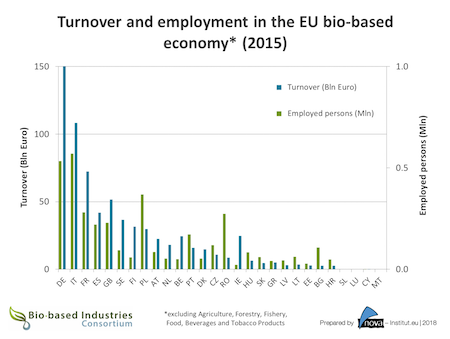The bioeconomy comprises those parts of the economy that use renewable biological resources from land and sea – such as crops, forests, fish, animals and micro-organisms – to produce food, materials and energy. In 2016, a study conducted by nova-Institute on behalf of the Bio-based Industries Consortium (BIC) showed for the first time which macroeconomic effects are generated by these activities, e.g. turnover, employment etc. for the years 2008 and 2013. This study has now been updated with data for 2014 and 2015.
Eurostat was used as the main source of data for all sectors of the bioeconomy. Some sectors, such as the forest-based industry, are fully bio-based and thus fully accounted to the bioeconomy. For other sectors such as the chemical industry, the bio-based shares were estimated and included in the data.
The analysis of the Eurostat data of 2015 shows that the turnover of the total bioeconomy, including food and beverages and the primary sectors agriculture and forestry, results in 2.3 trillion € in the EU-28. Roughly half of the turnover is accounted for by the food and beverages sector, almost a quarter is created by the primary sectors, agriculture and forestry. The other quarter is created by the so-called bio-based industries, such as chemicals and plastics, pharmaceuticals, paper and paper products, forest-based industries, textile sector, biofuels and bioenergy.

The bioeconomy employs 18.5 million people in total. The primary biomass production, mainly agriculture plus forestry and fishery, generates a lot of employment (55%) but low turnover (20%). The data show clear differences between groups of Member States: e.g. the Eastern European countries Poland, Romania and Bulgaria apparently are stronger in less value added sectors of the bio-based economy that generate a lot of employment. In comparison, Western and Northern European countries generate much higher turnover compared to the employment generated. The countries with the highest ratio between turnover and employment are Ireland, Finland and Belgium.
As in the 2016 study, this update highlights the contribution of the often underrated bio-based industries, such as chemicals and plastics, pharmaceuticals, paper and paper products, forest-based industries, textile sector, biofuels and bioenergy to the bioeconomy. This sector shows considerable turnover of almost 700 billion € and 3.7 million employees in the EU-28 in 2015. In the bio-based chemical industry alone, turnover amounted to around 30 billion €.
The data show an overall slight increase in the bio-based share of the chemical industry in the EU-28 from about 6% in 2008 to 7% in 2015. The raw materials used by the chemical industry are about 50% organic (fossil and bio-based) and about 50% inorganic (minerals, metals).
Only taking the organic part into account, the overall bio-based share increased from 12% in 2008 to 15% in 2015. Denmark stands out as the one Member State with the highest bio-based share in the chemical industry in 2015, which is mainly due to the high production of enzymes. Latvia and Sweden follow primarily due to a large production volume of charcoal and tall oil.
For the first time, the study also looked at the contribution of the different chemical products to the total value and volume of bio-based chemicals. The study shows that odoriferous substances for the food or drink industries dominate in terms of bio-based production value while animal or vegetable fertilizers dominate in terms of production volume.
The full report “European Bioeconomy in Figures 2008 – 2015” is available for free and contains detailed information, 18 pages with 11 figures and 2 tables.
www.biconsortium.eu/library/bioeconomy-figures
www.bio-based.eu/markets
About the Bio-based Industries Consortium
The Bio-based Industries Consortium (BIC) is a non-profit organisation based in Brussels. It represents the private sector in a public-private partnership (PPP) with the EU on Bio-based Industries (BBI). Worth €3.7 billion, the partnership mobilises investment in innovative facilities and processes that manufacture high-quality bio-based products as well as in biorefining research and demonstration projects.
BIC is host to a unique mix of sectors that currently covers agriculture, agro-food, forestry, pulp and paper, chemicals, energy and other manufacturing sectors. With over 200 members including large companies, SMEs, SME Clusters, RTOs, universities, technology platforms and associations spread across Europe, BIC brings together an authoritative pool of cross-sector and multi-disciplinary expertise in the field of bio-based industries. http://biconsortium.eu
About nova-Institute
nova-Institute is a private and independent institute, founded in 1994; nova offers research and consultancy with a focus on bio-based and CO2-based economy in the fields of feedstock, techno-economic evaluation, markets, sustainability, dissemination, B2B communication and policy. Today, nova-Institute has 30 employees and an annual turnover of more than 2.5 million €.
www.nova-institute.eu
Press release as PDF file: 18-02-22 PR Bioeconomy 2015
Source
nova-Institut GmbH and Bio-based Industries Consortium, press release, 2018-02-22.
Supplier
Bio-based Industries Consortium (BIC)
nova-Institut GmbH
Share
Renewable Carbon News – Daily Newsletter
Subscribe to our daily email newsletter – the world's leading newsletter on renewable materials and chemicals










